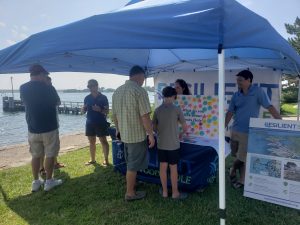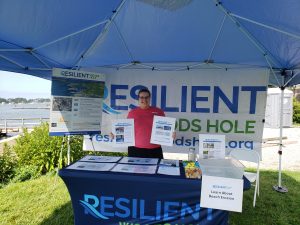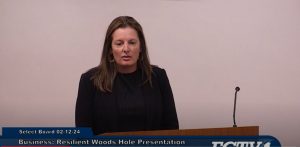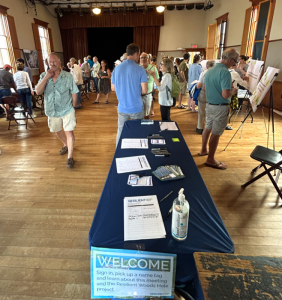Outreach and Engagement
Community outreach and engagement is an important part of ResilientWoodsHole's work. We have extensively engaged the Woods Hole community, including residents, business owners, employees, and town of Falmouth, along with visitors and other climate resilience organizations. Our outreach and engagement has included workshops, community meetings, presentations, participation in events, collaborations with other organizations, and other forms of stakeholder engagement.
Current Activities
RWH Ambassador Program
The ResilientWoodsHole Ambassador Volunteer Program invites community members to engage in promoting resilience and education in Woods Hole. Participants gain valuable experience in public outreach and science communication while fostering a sense of community and environmental responsibility.
For more information, visit the RWH Ambassador webpage.
RWH Climate Walking Trail
In October 2023, RWH launched the RWH Climate Walking Trail, a self-guided tour around Woods Hole that highlights local climate vulnerabilities, shares findings from our assessments, and showcases our actions. You can explore the trail through the RWH app or online.
Past Activities
From 2021-2025, RWH held several community symposiums and workshops. The goal of these workshops was to bring together all stakeholders, including experts, decision-makers, and community members, and discuss areas of collective action for a resilient future.
Visit the workshops and symposiums page to view the workshop summary and materials.
Most recently, RWH held a Community Workshop in August 2025 with several different stations for participants to visit, including a homeowner strategies station, meet the Town of Falmouth Coastal Resilience Specialist, discuss floodproofing with representatives from floodproofing.com, learn about emergency preparedness, and evaluate the dynamic adaptation pathways.
RWH teamed up with the Nobska Lighthouse and Maritime Museum to create a climate resilience exhibit, which opened in May 2024. The exhibit features a 3D model of Woods Hole, a post for the RWH Climate Walking Trail, historic and current photos, and insights on climate change in the area.
For hours and directions, check out the museum website!


RWH participated in several events in recent years, including the Woods Hole Science Stroll (2023-2025), the WaterWorks event (2024-2025), and Cape Cod Coastal Resilience Week (2024).
 RWH researchers have presented on Woods Hole sea level rise and flooding projections, and our initiative to many different organizations throughout the years, including the Children's School of Science, WHOI Marine Policy Center, Town of Falmouth Select Board, West Falmouth Public Library, NACSETAC, the Woods Hole Business Association, the Woods Hole Community Association, William College, MBL's Logan Science Journalism Program, the 2020 National Coastal & Estuarine Summit, the Islands Conference (2024-2025), and the Net Zero Conference (2024-2025).
RWH researchers have presented on Woods Hole sea level rise and flooding projections, and our initiative to many different organizations throughout the years, including the Children's School of Science, WHOI Marine Policy Center, Town of Falmouth Select Board, West Falmouth Public Library, NACSETAC, the Woods Hole Business Association, the Woods Hole Community Association, William College, MBL's Logan Science Journalism Program, the 2020 National Coastal & Estuarine Summit, the Islands Conference (2024-2025), and the Net Zero Conference (2024-2025).
 RWH launched the Neighborhood Working Groups (NWG), which met three times over 2023 to discuss climate change impacts, sea level rise and flooding projections, adaptation strategies and areas within their neighborhood that are of concern. Each NWG was made up of 1-2 neighborhoods in Woods Hole and comprised of 5-15 residents. You can read the summary of each meeting and a resources on the NWG webpage.
RWH launched the Neighborhood Working Groups (NWG), which met three times over 2023 to discuss climate change impacts, sea level rise and flooding projections, adaptation strategies and areas within their neighborhood that are of concern. Each NWG was made up of 1-2 neighborhoods in Woods Hole and comprised of 5-15 residents. You can read the summary of each meeting and a resources on the NWG webpage.
RWH distributed a survey in March 2022 to the Woods Hole community. The survey asked about locations where flooding is known to occur in Woods Hole, the important features of Woods Hole, and potential adaptation strategies. Overall, there were 41 responses to the survey, primarily from seasonal and year-round residents of Woods Hole. One key finding is that participants felt that 'no action' was an undesirable approach in future climate resilience planning. To read more about the stakeholder survey, please view the Phase 3 Report.
